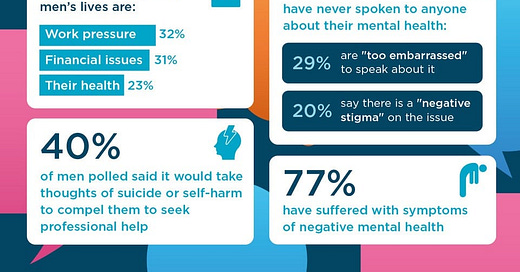Silent Killer - The Importance of Men's Mental Health
The Conundrum of Men’s Mental Health
Recent events in the United States have sparked a much-needed conversation, which is that of men’s mental health. In some particular instances, the conversation surrounding men’s mental health has led to a variety of spectrums across society discussing the phenomenon and why it’s important. News outlets use it as a way to discuss why mass shootings occur, public speakers use it as a way to discuss why men are sad or depressed, and veterans and much of the general public use it to discuss why many men commit suicide. These are valid points, and we’ll discuss the relationship between men’s mental health with suicide, violence, what is currently being done, and what can be done about the issues.
In 2019, 80% of suicide deaths in America were attributed to men. Most men without a mental health condition committed suicide “more commonly experienced relationship problems, arguments or another type of personal crisis as precipitating circumstances than for those with prior histories.” In fact, 60% of men who committed suicide did not have a mental health issue. If it’s not mental health issues that are causing most suicides, what is?
A study in the United Kingdom found that 40% of British men won’t talk about their mental health with close friends, family, or any medical professional. The main reasons men chose not to speak were not wanting to be a burden to anyone (36%), embarrassment (29%), the negative stigma (20%) not wanting to appear weak (16%), and feeling like they had no one to talk to (14%). The prevalence of mental health illnesses appears less commonly in men than in women, although women are more likely to seek help than men.
On another footing, news outlets have often reported that most mass shooters are men. To avoid repeating information, our post on firearms and mass shootings goes into more depth as to why men turn to violence. Essentially, most men who commit mass shootings have experienced several stressors in their lives, and when unable to handle them they lash out in the form of violence.
What’s currently being done and what can be done
There is a stigma among men that they do not want to appear weak by seeking or receiving help. This is not helped by the fact that men showing vulnerability, like public speaker Jordan Peterson crying, results in famous social media figures, like Drew Afuelo, making fun of them. While not conclusive, the stigma may show why men are 2-3 times more likely to misuse drugs than women, and 62,000 men die from alcohol-related causes compared to 26,000 women. In fact, the Behavioral Health Aspects of Depression and Anxiety in the American Male (BHADAAM) in 2019 argued that the stigma is a major reason why men don’t seek help. This causes men to feel alone, further exacerbating their problems. Hearst Media, the parent company of Men’s Health, asked over 1,500 men about healthcare concerns. One-third of men said they would not seek mental healthcare if they were experiencing anxiety or depression. And with 6 million men in America experiencing depression, many men are not seeking the help they can get. COVID-19 lockdowns did not help them either, with people being literally isolated from one another with little to no contact for prolonged amounts of time. Lastly, while controversial figures like Andrew Tate have defended the importance of men's mental health, it doesn't downgrade the importance or necessity of looking after it. Regardless of who makes the claims, mental health is a serious issue that needs support from all fronts.
Taylor Draper, the lead designer for Inherent Clothier, is just one man trying to pave the way to spread awareness about men’s mental health. They provide resources and host events for men to help them share their problems and simply unwind. For example, in their Colorado Springs location, they hold events every last Thursday of the month exclusively for men to meet up and talk. They provide the venue, the food, and drinks, all for free. It could be a community-based approach like Inherent where men can seek help the most. Black men, for example, are more likely to seek out help in informal places, such as religious institutions. These types of places can provide some kind of comfort or aid for struggling men. We also need to change the way we think about men as some kind of steel wall of emotion. Men, as cliche as it sounds, have feelings too.
If you are contemplating suicide, please call 988. It is manned 24/7, and they are there to provide you with help. Do not end your life because of your struggles. A permanent solution to a temporary problem is not the answer.





